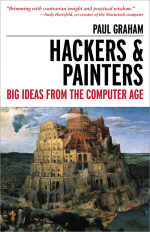Founded, funded by Y Combinator
Reddit is founded by Huffman and Ohanian both 22-year-old graduates of the University of Virginia. In first year they had rooms across the hall from each other, and became friends through video games.
Huffman wanted to make a phone system to order subs while he was pumping gas at a local gas stand. Ohanian calls a lawyer and they formed a company called RedBrick Solutions, because Charlottesville is full of red brick buildings. In the spring of their senior year they go to Boston to see a presentation by Graham at Harvard called “How to start a start-up”. They were able to get Graham to meet them for drinks at a local bar where they pitched their phone idea. A few days later, Graham tells them to apply for his new investment fund, Y Combinator. The students travel to Boston to pitch, but are rejected. On the way back to Charlottesville Graham calls them to say he wants them to come up with another idea — a web app. They decide to match the mechanism of Delicious with the content of Slashdot to build “the front page to the web”.
Y Combinator gives them $12,000 and they move to Boston in early June, 2005. After a few weeks the site is not ready when Graham links to it from an essay, giving it site 1000 hits. Reddit was the first Y Combinator launch, taking a total of $100,000. To make the site appear popular they populate it with fake posts.
Talk becomes Y Combinator idea
0 CommentsGraham’s talk to Harvard undergraduates leads to the idea of a startup accelerator after early-stage investors got Viaweb off the ground:
I told them to raise money from angel investors, preferably people who have started start-ups themselves.
With the audience looking expectant, he adds:
Not me.
How To Start A Startup talk
Graham gives a talk at the Harvard Computer School in which he says successful startups need to start with good people, to make something customers actually want, and to spend as little money as possible.
If there is one message I’d like to get across about startups, that’s it. There is no magically difficult step that requires brilliance to solve.
Onlamp interview
Graham is interviewed for Onlamp.com about Painters And Hackers, and talks about the Arc programming dialect, how brevity makes code more beautiful, and whether he is inspired by humanists or mathematicians:
I think there is a middle path. It’s good for languages to be inspired by math, but they have to be inspired in the right way by it.
Hackers And Painters
 Graham publishes a collection of essays that outlines the impact computer programmers have on everyday life. Part of the book focuses on education in high school and afterwards, and how students should be taught:
Graham publishes a collection of essays that outlines the impact computer programmers have on everyday life. Part of the book focuses on education in high school and afterwards, and how students should be taught:
The most a teacher can do is suggest interesting paths — e.g. by setting interesting problems to solve, or by describing mistakes other people have made.
Graham, Livingston dating
Graham and Livingston start dating. Livingston:
We met at a party in Cambridge Massachusetts randomly. It’s kind of a funny story. I actually went, he was co-hosting the party with a friend of his, I was with a guy I was taking a class at Harvard Extension School with. I wasn’t gonna go, it was a Saturday night and I didn’t have a friend to go with me so I wasn’t gonna go but I went anyway. I arrived on the doorstep, and I said “ Oh, I’m Jessica, I’m friends with Murat and I’m here for the party” and he said “Murat? Didn’t you hear? He moved to Arkansas last week to join the Wes Clark campaign. He’s not here tonight.” So, I said, “Oh my God, I’m not gonna know anyone.” I did not know one person at this party and I went in and had a great time and met, you know Paul, and Trevor, our other co-founder and just hit it off. And then Paul and I started dating and I started meeting more people who are involved in start-ups.
Essays
0 CommentsBegins working on Arc
0 CommentsGraham and Morris begin working on the dialect of Lisp as the two main dialects of the programming language, Common Lisp and Scheme, have not substantially changed since the 1980s. He says in 1985, a language was a specification but now a good, free implementation is required along with large libraries and regular updates.
Another thing has changed since 1985: Unix won. So there is a lot more agreement now about what you can expect from the [operating system]. Common Lisp and Scheme date from a time when languages had to be OS-neutral.
Leaves Yahoo
Graham leaves Yahoo after spending one and a half years working on Yahoo Store, the new iteration of Viaweb. He says the company lacked a clear vision, and was somewhere between a tech company and a media company:
Project managers at Yahoo were called “producers,” for example, and the different parts of the company were called “properties.” But what Yahoo really needed to be was a technology company, and by trying to be something else, they ended up being something that was neither here nor there. That’s why Yahoo as a company has never had a sharply defined identity.
Yahoo buys Viaweb
Yahoo issues 455,000 common shares in exchange for Viaweb, valuing the deal around $49 million. Viaweb now has 21 full-time employees at its Cambridge, Mass., headquarters. Graham says it was an early prototype for today’s startups:
The reason we know that it’s possible to start a start-up with about $10,000 and someone to help with the paperwork is because that’s exactly what we had.
Develops search algorithm
0 CommentsViaweb develops a search algorithm called Revenue Loop. Merchants bid a percentage of sales for traffic, and results are sorted by the bid multiplied by the average amount a user would buy. Graham:
Revenue Loop was the optimal sort for shopping search, in the sense that it sorted in order of how much money Yahoo would make from each link. But it wasn’t just optimal in that sense. Ranking search results by user behavior also makes search better. Users train the search: you can start out finding matches based on mere textual similarity, and as users buy more stuff the search results get better and better.
Early adopter of web search
0 CommentsGraham is an early adopter of web search, recognizing the potential of search engines in 1997. Startup advisor and angel investor Ali Partovi:
Why did he and I see the importance of search when the search companies themselves didn’t? Because we had a unique advantage: context. We interacted daily with the folks that Yahoo didn’t even recognize as its customers yet: the small businesses that were dying to get listed on Yahoo search.
Interest from Yahoo
0 CommentsViaweb’s client base is five times larger than a year earlier, and Yahoo starts showing interest in buying out Graham and Morris.
Viaweb has 70 clients
0 CommentsBuyers for the software include major clients like Rolling Stone and International Male.
Publishes ANSI Common Lisp
 Graham publishes a reference manual for the programming language, including a guide to optimization, macros, and an appendix on debugging.
Graham publishes a reference manual for the programming language, including a guide to optimization, macros, and an appendix on debugging.
Markets Viaweb
0 CommentsWith the product developed, Graham starts calling on potential customers, offering to set up and manage their online stores for $100 to $300 a month. Because Viaweb is a software program that runs inside a Web browser, he is able to continually respond to customer feedback.
We learned quickly by paying attention to the users.
Develops retailing software
0 CommentsGraham and hacker Robert Morris, who know each other from Harvard, begin developing software for retailers.
Netscape was about to do this big IPO, and they had a huge PR campaign. Netscape was saying that people were going to buy and sell a lot of stuff online. So we thought, OK, we’ll write software for people to buy and sell things online.
They borrow $10,000 from lawyer Julian Weber, who is married to one of Graham’s painting teachers, and buy a Web server and started writing code.
It was one scary moment after another. We didn’t know what a term sheet meant or what a valuation was or that companies had boards of directors. All of those things just seemed like words we’d read in a newspaper.
Programs in Lisp
0 CommentsThe program is one of the first commercial applications to use the language:
Robert and I both knew Lisp well, and we couldn’t see any reason not to trust our instincts and go with Lisp. We knew that everyone else was writing their software in C++ or Perl. But we also knew that that didn’t mean anything. If you chose technology that way, you’d be running Windows. When you choose technology, you have to ignore what other people are doing, and consider only what will work the best.
Viaweb business plan
0 Comments Originally called Webgen, the company’s business plan outlines its idea to reduce costs by allowing users to develop their own online cataloge, and the idea of selling software rather than services:
Originally called Webgen, the company’s business plan outlines its idea to reduce costs by allowing users to develop their own online cataloge, and the idea of selling software rather than services:
Webgen’s generator can be used interactively by anyone with a modem and a copy of Netscape. This will lower the cost of putting a catalog online by, say, 90%. It also means that our volume is not limited by the number of clients we can serve personally. We would be a software company, not a service company.
